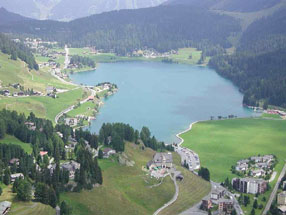Erin Chapman

High in the Swiss Alps lies the small town of Davos. Its 13,000 inhabitants enjoy the fantastic skiing, the fine ales of Monstein Brewery (“last beerstop before heaven”), and the thrilling disaster potential housed in the Institut für Schnee und Lawinenforschung (Institute for Snow and Avalanche Research). Once every year, though, the mountain hamlet explodes with international schmoozapalooza as the World Economic Forum hosts its annual meeting. For five days, more than 1,400 of the world’s CEOs and business elites join with another 1,100 political and intellectual giants to network, exchange ideas and shape global policy. Oh, and also to take fondue-making classes. Don’t you feel like Nouriel Roubini does a mean raclette?
The Davos meeting is organized by the World Economic Forum (WEF), an independent, Geneva-based not-for-profit “committed to improving the state of the world.” First established in 1971 by University of Geneva professor Klaus Schwab, the WEF began as a round-table where leaders of the European business world could discuss how to best compete with their American counterparts. The initial endeavor was such a success that the organizers decided on making it an annual event. Davos was chosen not because Professor Schwab was a huge Thomas Mann-iac (it’s the setting of Magic Mountain), but because the remote surroundings lent an air of privacy to the conference.
In 1973, the focus of discussions began to shift away from European business as the Arab-Israeli War and the collapse of the Breton Woods system of international monetary relations brought a distinct global political edge to the talks. Politicans appeared on the scene soon after and in 1976, membership in the WEF was offered to the “1,000 leading companies of the world.” In the ’80s and ’90s, Davos was the setting for quite a few Top 40 Diplomatic Hits – Greece and Turkey turning back from the brink of war, ministerial meetings between North and South Korea, the historic encounter of Nelson Mandela and South African President F.W. de Klerk, and the landmark draft agreement on Gaza between Shimon Peres and Yasser Arafat. (Hmmm… guess they never said long-lasting diplomatic successes.)
Today, the WEF continues in its aims to shape global and industry strategies and improve “the state of the world.” My favorite question on the World Economic Forum’s FAQ page – “Is the World Economic Forum just a private club for the rich and powerful?” Answer? “Far from being a ‘rich man’s club,’ the World Economic Forum is a unique platform for progress on some of the most difficult problems facing the world today.” Phew. Rest easy, all you conspiracy theorists exposing little-known but all-powerful cabals from your moms’ basements. Rest easy.
The theme of the 2009 Davos meeting is Shaping the Post-Crisis World and co-chairs include illuminati- Oops, I mean luminaries like Kofi Annan, Rupert Murdoch and Jeroen van der Veer, Chief Executive of Royal Dutch Shell. Past years have seen leading political lights such as Richard Gere, Michael Douglas, and Angelina Jolie hobnobbing with the hoi polloi, but this year not even Bono will be attending (gasp!) Perhaps the rest of U2 has finally convinced him to get back to focusing on their signature sound. Quite a few heavy-hitters are in attendance, however – among them Chinese Premiere Wen Jiabao, former UK Prime Minister Tony Blair and keynote speaker Prime Minister Vladimir Putin. (Begging the question – Who’s tiger-sitting ?)
Corporate attendees pay high prices to attend – an annual membership to the WEF costs over $35,000, plus another $15,500 or so for each person sent, not including accomodation. For this bargain basement outlay, participants can go to the more than 200 official sessions. The official program lists workshop titles that you might expect like “Update 2009: The New Boundaries of Financial Governance” and “The Future of Development Assistance,” but also on the roster are discussions like “Political Art: What Now?” and the ever popular “Leadership Lessons from Shakespeare’s ‘As You Like It'” and the sequel – “Leadership Lessons from Shakespeare’s ‘Macbeth’.” Lesson One: Don’t be fooled by witches’ prophecies. If only they’d held that one before the global economic downturn, we might have been able to turn this thing around.
Not everyone in Davos is a conference-goer, however. In recent years, the forum has also seen anti-globalization protestors converging on the town, lighting fires in the streets and even trashing the town McDonald’s. (Have they no decency?!) Barricades, barbed wire, hundreds of police and thousands of soldiers protect the dignitaries, costing up to $7 million. Maybe hosting large, global conferences could provide just the employment opportunities we’ve been looking for in the States…
(Sources: BBC, Forbes, Huffington Post, NY Times, Wall Street Journal, World Economic Forum)
